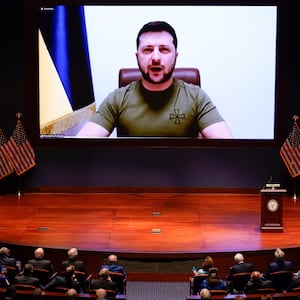Following a remarkable address delivered to Congress by Ukrainian President Volodymyr Zelensky in which he pleaded for further military assistance to fend off the Russian invasion, President Joe Biden committed on Wednesday to increasing “enormous levels of security and humanitarian assistance” to Ukraine—but made no promises to provide fighter jets or implement a no-fly zone, as Zelensky hoped.
“I’m not going to comment on that right now,” Biden said, in response to a shouted question of what it would take for him to support sending MiG-29 twin-engine jet fighters to Ukraine.
Biden committed instead to giving Ukraine “the arms to fight and defend themselves through all the difficult days ahead,” noting that the administration’s most recent military and humanitarian assistance package will include 800 anti-aircraft systems “to make sure the Ukrainian military can continue to stop the planes and helicopters that have been attacking their people,” as well as thousands of small arms and millions of rounds of artillery.
ADVERTISEMENT
“This could be a long and difficult battle. But the American people will be steadfast in our support of the people of Ukraine in the face of Putin’s immoral, unethical attacks on civilian populations.”
But the announcement fell far short of the request that the Ukrainian president made earlier on Wednesday, when he personally asked Biden—and 535 members of Congress—to help secure his nation’s skies.
“Being the leader of the world means to be the leader of peace,” Zelensky said, addressing Biden directly in a live video feed from Kyiv, which remains under Ukrainian control.
Zelenskyy made clear in his address Ukraine’s need to protect its skies from a Russian air force that has claimed the lives of untold thousands of his fellow citizens over the past three weeks. Russian aerial bombardments have indiscriminately targeted civilian infrastructure in Ukrainian cities since the invasion began—images of which Zelenskyy shared with members of Congress in a video that depicted Russian aircraft attacks on apartment buildings, hospitals, and Ukrainian refugees fleeing the war on foot.
The lawmakers who packed into a Capitol Hill auditorium to hear Zelensky’s speech were deeply moved—some to tears—by the video.
Afterwards, a number of lawmakers openly wrestled with the fact that this emotional video closed with a desperate request they know the U.S. won’t fulfill: “Close the sky over Ukraine.”
Nearly every lawmaker, Republican and Democrat, exited the speech stressing support for Ukraine—while reiterating concerns over taking the drastic escalatory step of imposing a no-fly zone.
Sen. Angus King (I-ME), a member of the Senate Intelligence and Armed Services Committees, suggested that the upside of a no-fly zone might not actually justify the risks. The main threat to Ukrainians’ safety, as King described it, is the relentless shelling coming from ground-based artillery, which a no-fly zone would not address.
“This is a very delicate situation where we have to do everything we can to support the Ukrainians without provoking World War III with a dangerous dictator with nuclear weapons,” King said.
But barring the implementation of a no-fly zone over Ukraine—which the Biden administration has essentially declared a red line, despite a resistance to using that phrase—Zelensky pressed Congress to allow for the transfer of fighter jets to the Ukrainian Air Force.
“If this is too much to ask, we offer an alternative,” he said on Wednesday of a no-fly zone. “You know how much depends on the battlefield on their ability to use aircraft—powerful, strong aviation to protect our people, our freedom, our land.”
“Aircraft,” Zelensky said, “can help Ukraine.”
So far, however, the Biden administration has pushed back on the notion that Ukraine requires access to fighter jets like the MiG-29s that Poland offered the country last week. Explanations have vacillated between Pentagon spokesperson John Kirby asserting that the administration wants to avoid provoking Russian aggression against NATO to statements from White House press secretary Jen Psaki implying that Zelensky is wrong about his own country’s defense needs.
“Adding aircraft to the Ukrainian inventory is not likely to significantly change the effectiveness of the Ukrainian Air Force relative to Russian capabilities,” Psaki told reporters on Tuesday, citing a Pentagon assessment. “The transfer of these planes may be mistaken as escalatory, as we’ve said, and could result in a significant Russian reaction.”
“That risk assessment,” Psaki said, “has not changed.”
As the war enters its fourth week, a narrative has emerged in Washington: that congressional pressure has been essential in pushing the Biden administration to adopt the toughest measures against Russia and in favor of Ukraine.
With lawmakers continuing to urge the administration to send specific weapons to Ukraine and advising when to send them, some leading voices on Capitol Hill are urging colleagues to take a step back and trust Biden and his team.
“I’m not sure it helps to have Congress micromanaging,” said Sen. Chris Murphy (D-CT), a member of the Senate Foreign Relations Committee who has traveled to Ukraine frequently in recent years.
“For us to be telegraphing to Russia every single day our divisions about what kind of defensive support Ukraine should get, and telegraphing what weapons systems we are transferring… this is a bit of a strange way to be prosecuting a war,” he said. “There’s some level of war strategy that is better off inside the administration.”
Republicans have been far less inclined to leave it to Biden, however. And lawmakers in both parties have hardened their support for further direct military assistance—including the MiG-29s that Zelensky says are critical to preventing a complete occupation.
“More S-300s, more Javelins, more drones, more Stingers, more everything,” Sen. Ben Sasse (R-NE) said. “The administration talks about this like it’s somehow some nerd-lawyer discussion, not like it’s a moral battle between good guys and bad guys, and we need the good guys to win.”
“If it shoots,” Sasse said, “we should ship it.”








